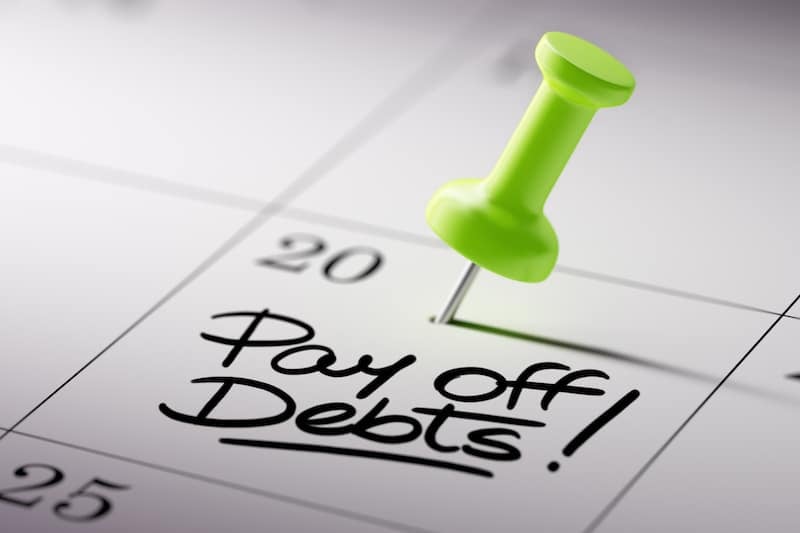
It’s not a secret that staying out of debt affects our overall well-being. In fact, it would be ideal to not owe money and not have to make constant payments.
That said, the ability to borrow money helps many people achieve goals like buying a house, starting a business, or getting an education. However, it can also be a source of stress when it becomes overwhelming and unmanageable.
So, let’s talk about how to stay out of debt. We hope that you can leverage these tips to help you build a solid financial foundation!
Why staying out of debt is a good pursuit
Even though we accept debt as part of life, living with it is a major source of stress for many people. In fact, a recent Mind over Money survey from CNBC found that 45% of Americans are worried about how to manage their debts.
The respondents also said that the strain of carrying debt affects their work, relationships, and physical well-being.
That said, let’s discuss a few benefits of staying out of debt.
You have less stress
Staying out of debt means you’re not constantly worried about money. You won’t have to work overtime or take on extra jobs to pay off debt.
You have time and energy to enjoy life. Furthermore, when you don’t owe money, you can spend money without feeling guilty.
You keep more of your income
When you have debt, a percentage of your income goes into repaying it. It’s also expensive to carry a lot of debt because your paying for interest and fees.
If you learn how to stay out of debt, you keep more of your income. You have money to build an emergency fund, contribute to a retirement fund, or go on a dream vacation.
Your credit will improve
Not owing money improves your credit score because you’re showing that you can be responsible with your credit. A high credit score means you can get better interest rates and terms on loans you apply for.
In addition, good credit makes it easier to get approved for an apartment or find a better job. Because landlords and employers typically look at an applicant’s credit report to consider if they’re reliable and responsible.
How to stay out of debt
Research and studies say that staying out of debt is beneficial to your mental and physical well-being and financial health. But knowing is one thing, actually doing it is the hard thing.
So, here are some key steps you can take to help you to not owe money, live fully, and build wealth.
1. Know your income
The first step for staying out of debt is knowing how much you make. Tracking your income may be easier if you’re a salaried employee.
If you’re a business owner or a freelancer, you’d need to calculate your earnings per month. Make sure to add in income from other sources as well.
Benefits to tracking your income
Knowing the exact amount you bring in each month means you know how much you have to work with. It’s a great starting point to help you create a realistic budget for yourself.
Tracking your income also shows if you’re making enough to cover your expenses. It can be upsetting and discouraging to learn you spend more than you earn.
But knowing is half the battle. With this discovery, you can start looking for ways to increase your income to bridge the gap. Otherwise, it would be difficult to not owe money if you’re using credit to make ends meet.
2. Track your expenses
Now that you know how much you earn, the next thing to do is keep tabs on your spending. Tracking your expenses shows you what you spend your money on and how much you spend.
Make a list of all your fixed expenses like mortgage or rent, utilities, phone bills, and car notes. Then, check your credit card or debit card for expenses on groceries, subscriptions, clothes, etc., and calculate the total.
You can use old-fashioned pen and paper or use spending apps like Credit Karma’s money management tool and YNAB.
When you understand where your money is going every month, you can take steps to cut back on some areas and put the money where you’d like it to go instead.
3. Create a budget
Staying out of debt takes more than tracking your income and spending. You have to be proactive, that’s why you need a budget.
Budgeting sounds scary for a lot of people because they think it means they can’t enjoy life anymore. But budgeting is planning where your money goes.
What budgeting really is and why it’s great
You are in charge of your income. So, you have control of your money and avoid impulse spending.
Budgeting helps you be more intentional with where you spend. You decide what your priorities are and let your budget reflect that.
And there are plenty of ways to create a budget, whether you just hate budgeting or you don’t earn the same amount each month, there’s a style out there for you.
4. Build your emergency fund
An emergency fund is precisely what the name suggests, money in the bank that you can use in case of emergency. A Bankrate survey revealed that 1 in 4 Americans have no emergency savings at all.
Without an emergency fund, it will be difficult to not spend on credit cards. Because when things like job loss, illnesses, or a busted furnace happens, you’d have no choice but to rely on credit to remedy the situation.
If you haven’t started an emergency fund yet, start with a few thousand in a separate savings account. Then, work your way up to saving at least 3 to 6 months’ worth of your basic necessities.
This means having enough to pay for food, housing, transportation, and essential utilities.
5. Plan your meals
Creating a meal plan is another tool you can use to not owe money. Essentially, you’ll plan for each meal of the day for a whole week or month.
The best thing is you don’t have to think about what to make for dinner every day. It also lowers the likelihood of ordering last-minute food delivery, which saves you money.
And grocery shopping is a breeze when you have a meal plan. Make a list of ingredients you need and do your best to only pick up items on the list. This helps you avoid impulse buying.


6. Ask for a raise
Learning to ask for a raise is a skill set you need to brush up on whether you’re starting a new job or in the same position you’ve had for years.
Aside from the boost in self-esteem, negotiating your salary also ensures that you’re not leaving money on the table – hundreds of thousands of dollars of lifetime earnings.
Staying out of debt is easier when your take-home pay is higher. So, assess your duties and responsibilities at work, and ask for that overdue pay increase.
How to ask for a pay increase
First, research your industry’s salary trends. Then, build your case. Give the reasons why you deserve the raise.
For instance, you may discuss how your skills and experience benefit the company’s revenue.
Finally, make sure to practice your delivery before you schedule the meeting. If possible, ask a mentor or a trusted colleague to go over it with you. This will help you feel more ready and sure of yourself heading into the discussion.
7. Start a side-hustle
For many of us, staying out of debt requires earning more money. So, if spending less isn’t helping you, why not start a side hustle?
To start a side hustle, reflect on your passions, interests, and skills. Additionally, consider how much time you have and what resources you have to start.
For instance, if you have a car, you can make money delivering food and groceries or driving for Uber and Lift. Similarly, you can open an Etsy shop if you’re crafty.
8. Start a sinking fund
A sinking fund is money you intentionally save towards a big expense. It’s for spending outside of your monthly budget such as Christmas shopping or travel.
According to a study by Deloitte, Americans spend about $1,455 on holiday shopping.
A sinking fund is a good way to enjoy the holidays while staying out of debt. Because you’re better prepared for the expense, you can buy things without credit cards and without dipping into your other funds.
For instance, you can start a sinking fund for your holiday shopping this year. Say you want to save $1,455 by the end of the year, then you need to set aside $121.25 each month.
9. Opt for low credit card limits
While you work on self-discipline, opting for lower credit card limits can also help you not to owe as much. This is because it stops you from spending beyond what you can afford to pay outright.
A low limit also forces you to save up for large purchases rather than rely on your credit card to pay for them.
10. Save up for large purchases
Speaking of which, saving up for large purchases is another tool you can add to your arsenal for staying out of debt. Plan for expenses that are necessary but not immediate like travel, a new couch, or home renovation projects.
Set up a sinking fund for the purchase you’re saving for or use any saving method that works for you.
11. Use free amenities
To get out of debt and continue to not owe money, you need to be savvy in managing your hard-earned cash. This means taking advantage of free amenities like local libraries.
Instead of buying books or renting movies online, visit the library. Apps like Libby and Hoopla also make it easy to borrow books and movies from public libraries.
You can also check out what other free amenities you have in your area. Maybe you can cut down on your gym membership fees if you go to the community center instead.
12. Keep learning how to grow and manage your money
Many of us didn’t have access to good information about handling money growing up. That’s why money can be a difficult topic. If you’ve made mistakes in the past, give yourself grace and compassion.
Then, commit to learning how to grow and manage your finances. Make sure to invest time and effort in your personal growth and development. Read books, take courses, and stay in the Clever Girl Finance community.
Learning helps you to be more confident in making money decisions. You’ll discover the many ways to save, invest, or start a business. And it will definitely teach you how to not owe money.
Stay out of debt to live your best life!
In a world where we’re constantly engaged online, it’s tempting to say yes and effortlessly buy many things we don’t even need.
Start with being mindful of your spending habits and tracking your income. Commit to becoming intentional with every dollar you spend.
Remember small changes add up. Every step takes you closer to a debt-free life!











